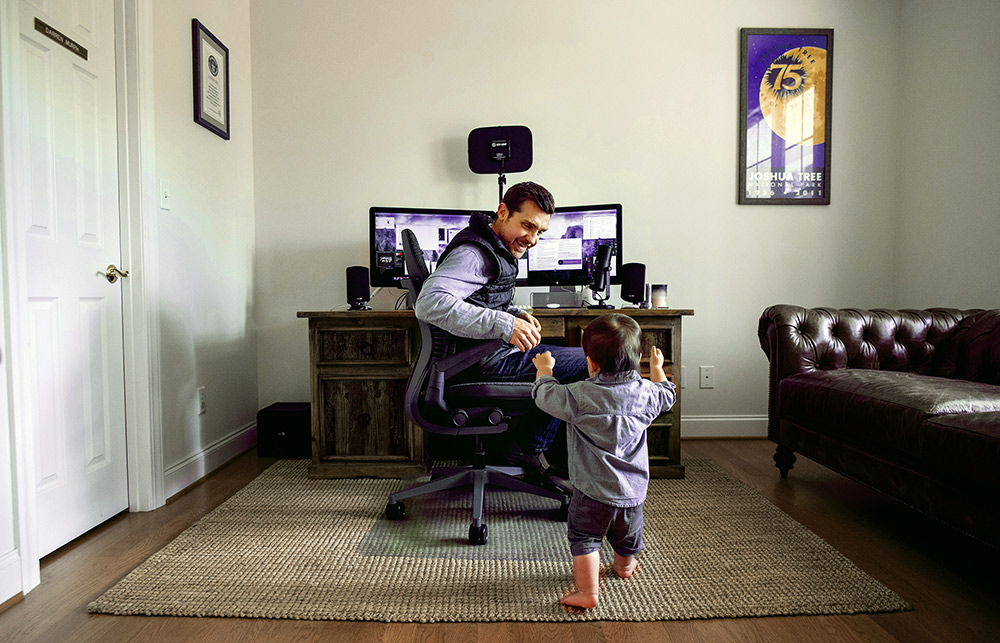达伦•默夫生活在北卡罗来纳州的沿海地区,这里远离硅谷,一派宁静气息。
这位技术主管说,这是他与妻子从小生长的地方,为了能在这里工作,“我付出了很大的努力”。过去15年间,默夫一直在远程工作,这一经历让他成为了自己新职位的理想人选:2019年7月,他被GitLab聘为远程工作主管。GitLab是一家为开发人员提供软件的创业公司,只在程序员的圈子里拥有极高知名度。很多人都从未听说过“远程工作主管”或GitLab还有这一职位,这很正常。因为大多数企业还都没有设立这样的职位,不过默夫认为这种情况即将改变。

默夫说:“远程办公与团队在办公室一起工作有许多细微差别。”员工如何入职?如何让他们有机会互相沟通交流?如何在没有办公室的情况下构建企业文化?身处北卡罗来纳州宁静的海边,默夫每天的工作就是想办法解决这些问题。
如果有哪家公司需要“远程工作主管”,那第一个肯定是GitLab。这家初创企业成立于2011年,在65个国家和地区拥有1200多名员工,公司旗下没有一间办公室。其首席执行官和联合创始人希德•斯日布兰迪日是荷兰人,生活在旧金山。而GitLab执行团队的其他成员则遍布全球。
默夫说:“许多远程办公公司的高层仍然会在一起办公,或者是生活在同一时区,这就会形成一种可见的权力中心,而我们则希望避免出现这样的情况。”
默夫表示,分散的执行团队是实现远程工作或混合办公的关键所在。所谓混合办公即部分员工远程工作,部分员工在办公室上班。疫情过后,世界上可能会有许多公司转向这种工作模式。虽然其灵活性更强,但也带来了许多文化和后勤方面的问题。例如,上周Facebook的首席执行官马克•扎克伯格表示,十年之内,这家社交媒体巨头将有一半员工可能会转向远程办公。但他是否还会继续在Facebook位于加州门洛帕克庞大而又豪华的办公室里工作呢?如果答案是肯定的,那么结果可能就会造成公司员工队伍出现两级分化,在办公室办公的员工将有更多机会与决策者面对面沟通,或者至少会自认为自己更接近权力中心。
“公司总部只应是一个人们可以远程办公的地方。”默夫说。
与GitLab不同,Facebook等企业是因为新冠疫情而被迫采用了远程工作模式。“这不是远程办公,”默夫说,“只能说是疫情导致的在家工作。”
企业要想用好远程办公这种工作模式,就必须认真思考如何推出新的政策、改变自身文化。它们首先要做的可能就是聘用一位愿意投身此项事业的“远程工作主管”。如果企业还没有做好准备,那么它们也可以先看看默夫写的《远程工作指南》(Remote Playbook)。没错,他确实写了这么一本书。
译者:Feb
达伦•默夫生活在北卡罗来纳州的沿海地区,这里远离硅谷,一派宁静气息。
这位技术主管说,这是他与妻子从小生长的地方,为了能在这里工作,“我付出了很大的努力”。过去15年间,默夫一直在远程工作,这一经历让他成为了自己新职位的理想人选:2019年7月,他被GitLab聘为远程工作主管。GitLab是一家为开发人员提供软件的创业公司,只在程序员的圈子里拥有极高知名度。很多人都从未听说过“远程工作主管”或GitLab还有这一职位,这很正常。因为大多数企业还都没有设立这样的职位,不过默夫认为这种情况即将改变。
默夫说:“远程办公与团队在办公室一起工作有许多细微差别。”员工如何入职?如何让他们有机会互相沟通交流?如何在没有办公室的情况下构建企业文化?身处北卡罗来纳州宁静的海边,默夫每天的工作就是想办法解决这些问题。
如果有哪家公司需要“远程工作主管”,那第一个肯定是GitLab。这家初创企业成立于2011年,在65个国家和地区拥有1200多名员工,公司旗下没有一间办公室。其首席执行官和联合创始人希德•斯日布兰迪日是荷兰人,生活在旧金山。而GitLab执行团队的其他成员则遍布全球。
默夫说:“许多远程办公公司的高层仍然会在一起办公,或者是生活在同一时区,这就会形成一种可见的权力中心,而我们则希望避免出现这样的情况。”
默夫表示,分散的执行团队是实现远程工作或混合办公的关键所在。所谓混合办公即部分员工远程工作,部分员工在办公室上班。疫情过后,世界上可能会有许多公司转向这种工作模式。虽然其灵活性更强,但也带来了许多文化和后勤方面的问题。例如,上周Facebook的首席执行官马克•扎克伯格表示,十年之内,这家社交媒体巨头将有一半员工可能会转向远程办公。但他是否还会继续在Facebook位于加州门洛帕克庞大而又豪华的办公室里工作呢?如果答案是肯定的,那么结果可能就会造成公司员工队伍出现两级分化,在办公室办公的员工将有更多机会与决策者面对面沟通,或者至少会自认为自己更接近权力中心。
“公司总部只应是一个人们可以远程办公的地方。”默夫说。
与GitLab不同,Facebook等企业是因为新冠疫情而被迫采用了远程工作模式。“这不是远程办公,”默夫说,“只能说是疫情导致的在家工作。”
企业要想用好远程办公这种工作模式,就必须认真思考如何推出新的政策、改变自身文化。它们首先要做的可能就是聘用一位愿意投身此项事业的“远程工作主管”。如果企业还没有做好准备,那么它们也可以先看看默夫写的《远程工作指南》(Remote Playbook)。没错,他确实写了这么一本书。
译者:Feb
Darren Murph lives in coastal North Carolina, a peaceful place far from Silicon Valley.
“I fought really hard for this,” says the tech executive, about being able to work where he and his wife grew up. He has been a remote employee for the past 15 years. That makes Murph particularly well-positioned for his latest role: In July 2019, he was hired as the head of remote at GitLab, a startup that provides software for developers. If you’ve never heard of a head of remote (or of GitLab—it’s a household name only with coders), you’re not alone. Most companies don’t have one, though Murph believes that’s about to change.
“There’s a lot of nuance in getting this right when your team isn’t working in the same place every day,” says Murph. How do you onboard employees? How do you provide them with opportunities to network and socialize? How do you create a corporate culture without a physical office? This is what Murph spends his days dealing with—from the quiet shores of North Carolina.
If any company has a need for a head of remote, it’s GitLab. The startup, founded in 2011, employs more than 1,200 people across 65 countries and has zero company-owned offices. Its CEO and cofounder, Sid Sijbrandij, is from the Netherlands and technically lives in San Francisco. But other members of GitLab’s executive team are spread out all over the world.
“A lot of remote companies still keep their execs in an office, or in the same time zone, which creates a visible center of power that we intentionally try to avoid,” says Murph.
According to Murph, a dispersed executive team is key for a viable transition to working remotely, or taking a hybrid approach—one that allows for both remote and in-office workers. A hybrid approach is likely going to be embraced by many companies in the post-pandemic world. And while it enables flexibility, it also presents many cultural and logistical challenges. Case in point: Last week, Facebook CEO Mark Zuckerberg said that, within a decade, half of the social media giant’s employees could be remote. But will he keep working from Facebook’s sprawling, plush office in Menlo Park, Calif.? If so, the result could be a two-tier system in its employee base—those who work in the office will have more opportunities for face time with the decision makers or at least give the perception that they are closer to the powers that be.
“A company’s headquarters needs to be just a place where people can go to work remotely,” says Murph.
Unlike GitLab, companies like Facebook are being forced into accepting remote work because of the COVID-19 outbreak. “What you’re seeing now isn’t remote work,” says Murph. “It’s crisis-induced work-from-home.”
Companies that want to get remote right will need to be thoughtful and intentional about how they roll out new policies and how they change their culture. They may want to start with hiring a head of remote, someone who is devoted to the task. And if they’re not ready to make that jump, they can also just crib from Murph’s “Remote Playbook”—yes, he really did write the playbook.






